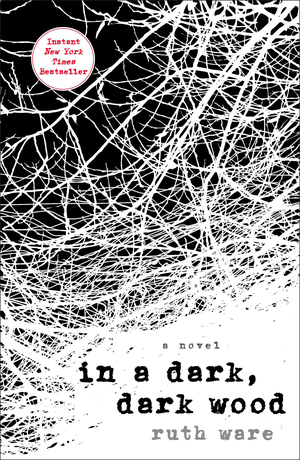In recent years, thrillers with unreliable narrators have become a thriving and best-selling genre, with books like Gone Girl and The Girl On the Train making way for countless others. I love thrillers because they invite the reader to try to put together a puzzle--to solve a mystery or figure out where the plot is going before being told. And what could be more challenging than attempting to do this based on information from a narrator who may be lying or delusional?
Needless to say, I've embraced the genre and read all the unreliable narrator thrillers I can get my hands on. Of the many books I've read in this burgeoning new category, the one that stands above the rest for me is Ruth Ware's In a Dark, Dark Wood.
When Leonora (known to some as Lee and some as Nora) is invited to a bachelorette party at a remote glass house in the woods for a friend she hasn't spoken to in years, she is at first doubtful. Why would Nora be invited to her estranged friend's party, especially when she isn't invited to the wedding? Despite her misgivings, Nora decides to attend.
What begins as an awkward weekend where old tensions resurface and secrets are revealed turns terrifying when the group begins to believe that they are not alone in the woods. Forty-eight hours later, Nora wakes up in a hospital bed with amnesia but knowing that someone in that house ended up dead. As the police bear down hard on Nora, she must try to remember: Who was the victim? What happened? And could Nora herself have been the killer?
Nora is the ideal unreliable narrator. She has dark and painful secrets in her past--like the reason behind her falling out with the bride-to-be--that she is reluctant to reveal to the reader. But her injuries following the bachelorette-party-gone-wrong add another thrilling layer to this. As the police question Nora about the deadly last night at the house, Nora is unable (or perhaps unwilling) to remember what happened.
Not only can we not rely on her truthfulness about her past, we also cannot rely on her recollections of the night in question. Are the events she is beginning to remember true? Is her mind repressing details that may be too painful to face? Is there more that Nora remembers that she isn't telling us? Nora's version of events is unreliable not only to us but also to the narrator herself, and that is what makes In a Dark, Dark Wood so compelling.
This is the kind of book that will keep you up at night guessing and second-guessing theories. It will have you eagerly flipping back to check details and folding down pages with important clues. One moment you'll trust Nora and sympathize with her, and the next you'll begin to doubt everything. Once you enter the dark, dark wood of the setting--and of Nora's mind--you'll be hooked until the very last breathless, stunning revelation.
Sarah Jane Abbott works in editorial for Simon & Schuster children's books.
More Recommendations from Off the Shelf:

